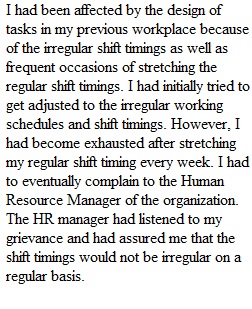


Q According to the Centers for Disease Control, Job Conditions That May Lead to Stress (Links to an external site.) • The Design of Tasks. Heavy workload, infrequent rest breaks, long work hours and shiftwork; hectic and routine tasks that have little inherent meaning, do not utilize workers’ skills, and provide little sense of control. o Example: David works to the point of exhaustion. Theresa is tied to the computer, allowing little room for flexibility, self-initiative, or rest. • Management Style. Lack of participation by workers in decision- making, poor communication in the organization, lack of family-friendly policies. o Example: Theresa needs to get the boss’s approval for everything, and the company is insensitive to her family needs. • Interpersonal Relationships. Poor social environment and lack of support or help from coworkers and supervisors. o Example: Theresa’s physical isolation reduces her opportunities to interact with other workers or receive help from them. • Work Roles. Conflicting or uncertain job expectations, too much responsibility, too many “hats to wear.” o Example: Theresa is often caught in a difficult situation trying to satisfy both the customer’s needs and the company’s expectations. • Career Concerns. Job insecurity and lack of opportunity for growth, advancement, or promotion; rapid changes for which workers are unprepared. o Example: Since the reorganization at David’s plant, everyone is worried about their future with the company and what will happen next. • Environmental Conditions. Unpleasant or dangerous physical conditions such as crowding, noise, air pollution, or ergonomic problems. o Example: David is exposed to constant noise at work. Often times, understanding which issues you are the most vulnerable to- will enable you to proactively manage- thus negating the impact that stress can cause. While this is not an exhaustive list of the scenarios that could effect your stress levels at work- I believe that most would acknowledge being impacted by at least one of these examples at sometime their professional life. 1. Which job condition were you effected by? 2. What did you do if anything to manage that experience? 3. What did you learn from the experience? (Powerful lessons are often gained from negative as well as positive reactions to these conditions) Please, only share those personal experiences that you feel comfortable with in this forum. I plan to share my own experiences as well in this discussion. Initial post due October 2nd 150 words + at least 1 reply.
View Related Questions